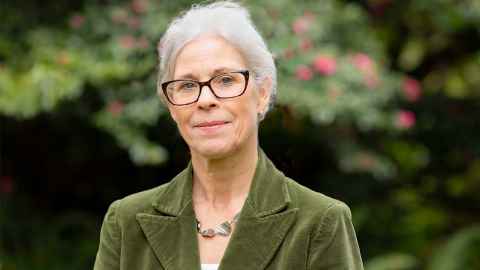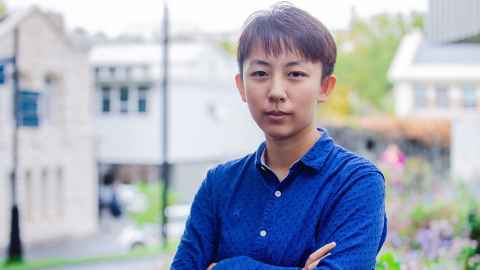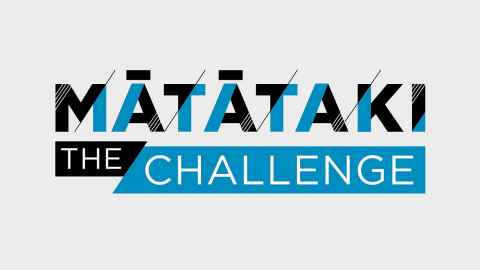The battle against the infodemic threat
25 October 2022
The pandemic saw the rise of misinformation, corroding trust in evidence, research and democratic institutions. The issue requires a global and coordinated response.

The Covid pandemic has brought personal tragedy on a global scale with more than 6.5 million deaths, along with deep damage to economies. A third and less obvious threat is the rise of misinformation.
Vice-Chancellor Professor Dawn Freshwater of Waipapa Taumata Rau, University of Auckland, says, “We’re dealing with another ‘virus’ that we need to ‘vaccinate’ ourselves against.”
In the first days of the pandemic in 2020, the WHO warned of an equivalent infodemic, defined as the circulation of too much information, false and misleading information. The WHO warned it would lead to confusion, people taking risks they shouldn’t, and the breakdown of trust in health authorities. To varying degrees the warning has been borne out.
Working with the Asia Pacific Rim Universities network (APRU) Professor Freshwater is leading one of three research streams responding to a challenge issued by former New Zealand Prime Minister Helen Clark – to prepare for the next pandemic. As well as research on combatting the infodemic, APRU researchers are also focused on biomedical research and public health strategies relating to pandemics.
The infodemic project will bring together top researchers across multiple disciplines to look at how we can respond to the rise of misleading and false information that fuel of conspiracy theories that in turn, corrode trust in governments and institutions.
Taking on her role at Waipapa Taumata Rau shortly before the pandemic, Professor Freshwater saw the tsunami of misinformation break upon society and within the University. The expertise at universities guided Aotearoa New Zealand’s initial evidence-based policy responses, but she outlines a broader role for universities.
“How can we use the cornerstone of university education, critical thinking, to enable us to make discerning decisions about what’s useful to retain, what’s useful to challenge and what’s useful to outright reject?”

Misinformation can rapidly impact individuals. Dr Jingwen Mu, the senior global strategy advisor at the University, observed this early in the pandemic when some media and politicians labelled Covid-19 the ‘Wuhan virus’ or the ‘Chinese flu.’ She likens the suspicion generated by these labels to the experience of the ‘Spanish flu’ in the 20th century. The flu was first documented in the United States not Spain.
Dr Mu says, “History repeats itself. We live in a modern, technologically advanced world, but it is still happening. The issue of misinformation has been under addressed at a time of the rise of digital technologies.”
The former Chief Censor David Shanks worked with Dr Mu on an initial paper for the infodemic project. When he held the role, his office was frequently fielding complaints about irrational and fear-based messaging. But even he could not have envisaged the February 2022 occupation of the grounds of Parliament that would see the rise of a meta-conspiracy theory.
“Who could have predicted that two years into it, people would think the pandemic was actually a plan to use genetically engineered organisms to spark a world vaccination programme involving vaccines containing self-assembling nanobots that would be activated through the 5G network to achieve total global mind control?”
The good news is that New Zealanders appear to retain a high degree of resistance to the ‘infodemic’. In a report commissioned when Shanks was Chief Censor, more than 80 percent said they were worried about misinformation, while almost three quarters of people said false information about Covid-19 presented an urgent and serious threat to society. Eighty four percent wanted something done to combat the threat posed by misinformation.

Dr Mu, with support and advice from Professor Robert MacCulloch and Dr Alexandra Dmitriev of the Business School, has created a way to benchmark the degree of ‘infodemic’ vulnerability with an index that works at a country level.
She envisages this forming the basis of further work and operating in the same way as Transparency International’s ‘corruption’ index which maps perceived levels of public sector corruption by country, with the index a foundation for civil society and government agencies to act.
The challenge for a similar infodemic vulnerability index is that there is no way to test it directly. By its very nature, misinformation sits in the domains of psychology and behaviour.
The indicator, Dr Mu cautions, is an initial attempt to illustrate what could be done.
The index draws on the Wellcome Global Monitor Trust in Scientists index. The assumption is that higher trust in science translates to better resilience against misinformation.
A further variable for the model is the Poynter Institute for Media Studies’ guide to government anti-misinformation actions. This has captured the governmental measures in place to combat misinformation before the pandemic.
The two measures are joined in the formula by GWI, a global audience research company and its measure of social media penetration, based on the average time per day spent online by social media users for people aged 16-64.
By taking individual country data for each of the variables, an initial Misinformation Vulnerability Index has been constructed to benchmark and compare a series of countries.
To validate the new index, Dr Mu correlated the misinformation index to the known uptake of vaccination in the respective countries, as recorded by the Bloomberg Covid Vaccine Tracker. Countries with high vaccination uptakes correspond closely to the misinformation vulnerability index, suggesting the indicator has value.
The top nine countries with the highest overall resilience to misinformation, Spain, France, Ireland, Italy, Belgium, Denmark, China, Germany, and Singapore have the highest average number of vaccinations per person, more than two. With the reverse at the other end of the scale, with Nigeria and Egypt have both low resilience to misinformation and low vaccination levels.
The next step sees Dr Mu seeking collaborators among APRU member universities. the Asia Pacific Rim Universities, a network of the 60 leading universities The work progress will be shared and discussed at the APEC forum in Thailand in November.
The balance between misinformation and freedom of expression is delicate. Professor Freshwater says universities have a role, not only in championing free speech but also as a primary source of evidence-based and informed decisions about societal issues.
For her the issue is trust. “Universities are and should be providing leadership in assisting government with policy generation. Government needs to have trust and assurances that the university sector are the right people to be providing that information.”
What we’re dealing with is the polemic between rationality and emotionality.
Story: Gilbert Wong
Mātātaki | The Challenge is a continuing series from the University of Auckland about how our researchers tackle some of the world's biggest challenges. Challenge articles are available for republication.
Media contact
Gilbert Wong | Research Communications manager
E: gilbert.wong@auckland.ac.nz
